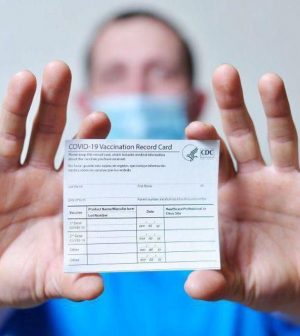- Recognizing the Signs of Hypothyroidism
- 10 Strategies to Overcome Insomnia
- Could Artificial Sweeteners Be Aging the Brain Faster?
- Techniques for Soothing Your Nervous System
- Does the Water in Your House Smell Funny? Here’s Why
- Can a Daily Dose of Apple Cider Vinegar Actually Aid Weight Loss?
- 6 Health Beverages That Can Actually Spike Your Blood Sugar
- Treatment Options for Social Anxiety Disorder
- Understanding the Connection Between Anxiety and Depression
- How Daily Prunes Can Influence Cholesterol and Inflammation
Young Cancer Survivors Vulnerable to COVID, But Often Shun Vaccine

Despite being particularly susceptible to severe COVID-19, many U.S. teen and young adult cancer survivors are wary of vaccination, a new study finds.
Cancer survivors often have weakened immune systems and are more likely to develop severe respiratory infections. That puts them at greater risk from COVID, so it’s strongly recommended that they get vaccinated.
In the new study, researchers surveyed cancer survivors, 18 and older, who were diagnosed between the ages of 15 and 39. They were in a cancer care program run by Huntsman Cancer Institute at the University of Utah and Intermountain Healthcare in Salt Lake City.
Of 342 respondents, 63% said they intended to get a COVID-19 vaccine, but 37% were hesitant.
“As life returns to some resemblance of normal, receiving the COVID-19 vaccine is as important as ever,” said study leader Austin Waters, a research program manager at the Huntsman Institute.
Women and respondents with lower levels of education were more likely to be hesitant than men or college graduates.
About 42% of young women surveyed indicated vaccine hesitancy, compared with 30% of men. Survivors with only a high school education or less were more than three times as likely to be vaccine-hesitant compared to college graduates.
The survey of cancer survivors also showed that 53% of Hispanic respondents were vaccine-hesitant, compared with 32% of whites and 20% of others, according to findings published June 29 in the journal JNCI Cancer Spectrum.
Overall rates of COVID vaccine hesitancy in the United States range from 20% to 40%.
“Oncology care providers and cancer centers should play an important role in encouraging young survivors to receive the vaccine,” Waters said in a journal news release.
He said special attention should be paid to vaccine hesitancy among at-risk groups such as young adult cancer survivors, especially women and those with a high school education or less.
More information
The American Cancer Society has more on COVID-19 vaccines.
SOURCE: JNCI Cancer Spectrum, news release, June 29, 2021
Source: HealthDay
Copyright © 2026 HealthDay. All rights reserved.










